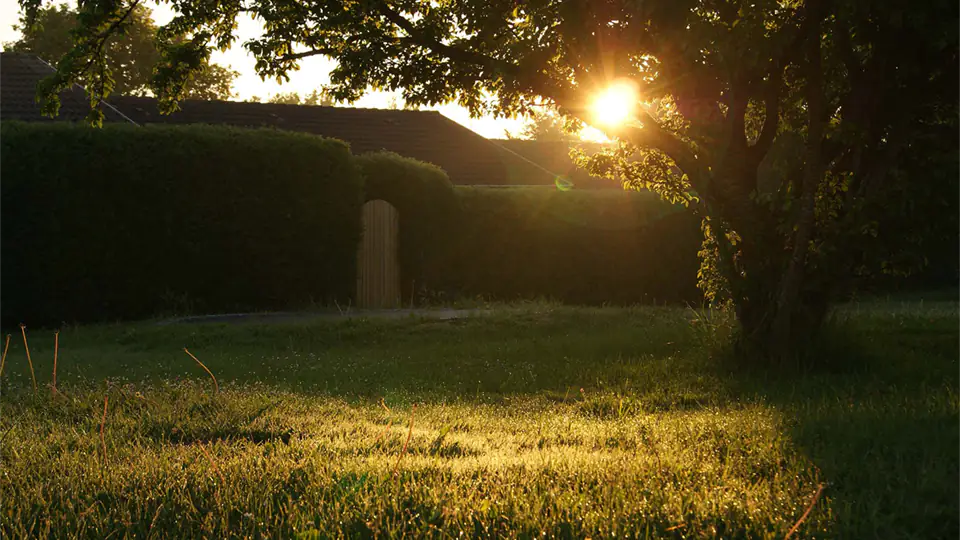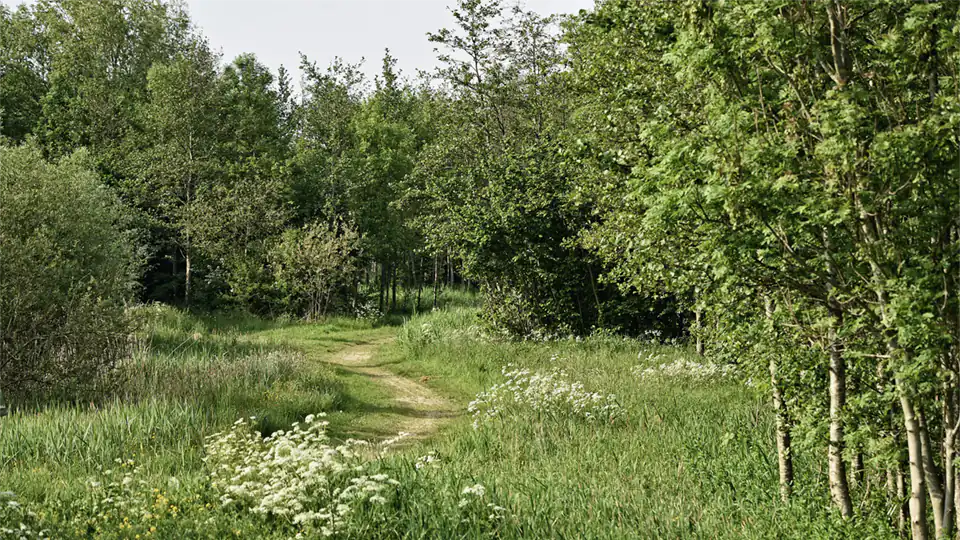Natural Burial Funerals & Home Burials
Planning a natural burial doesn’t mean you need a funeral director. Families in the UK can arrange the transport to a natural burial funeral or organise a home burial (DIY funeral) themselves. These eco-conscious farewells are often more personal, more affordable, and more sustainable than traditional funerals.
Table of contents
What are natural burial funerals & woodland burials?
- Natural burials are eco-friendly funerals that take place in green spaces
- Woodland burials are a type of natural burial specifically held within woodland areas
- Natural burials usually have stricter regulations, meaning only organic materials are permitted
Key features:
- Only biodegradable coffins, shrouds, or blankets are allowed
- Embalmed bodies are not accepted
- No headstones or plastic memorials are permitted
This type of funeral focuses on simplicity, respect for nature, and low environmental impact
Home deaths
- A body can usually be kept at home for up to one week in a cool area
- If the deceased had infections or wounds that may speed up decomposition, refrigerated storage at a local funeral director may be safer
- If a post-mortem is required, the hospital or mortuary will keep the body until collection
- Once the funeral arrangements are organised and after collection you can transport the deceased staight to the crematorium or burial site
A week is not long, and in more built-up residential areas or over Christmas or bank holidays it may not be possible to arrange and have the funeral within a week. Although possible, many families prefer to use a funeral director to store the deceased for both practical and emotional reasons.
Home garden burials

This is probably the most cost-saving method, often referred to as a DIY funeral or the cheapest possible funeral. There is no legal requirement in the UK to use an undertaker. Once the death is registered and you have the death certificate, you can carry out all funeral arrangements yourself. It is legal in the UK to bury a body in your own garden, but strict rules apply:
- You must own the land (not mortgaged)
- You must notify local authorities and update property deeds
- Burial sites must not risk contaminating groundwater. Minimum distances from water sources, drains, or wells must be followed
- Graves must be dug to the required depth
- No coffin is legally required, but records of the grave must be kept
Garden burials in more detail
This is often the most affordable option, sometimes called a DIY funeral. You may need permission from the local council (Environmental Health Department & Planning Department) as your garden may then be classed as a burial site. There are also regulations not to contaminate groundwater by not burying the body within a certain distance of running/standing water, field drains, ditches, a well, borehole or spring etc. You could check with the Environment Agency for groundwater regulations, including how deep the grave must be, although the Environmental Health Department would do this for you if needed.
You do not have to purchase a coffin, but you will need to keep a record of the grave and update the property deeds. It is sensible to keep in mind that having a body buried in your garden may make the property harder to sell. Digging a grave can be dangerous due to collapsing soil, so you may wish to hire a professional grave digging service.
Hospital deaths
If someone dies in hospital, the body is stored in the mortuary until funeral arrangements are made.
- Families can collect the deceased themselves with suitable transport, or hire a vehicle
- Mortuary staff may dress the deceased in chosen clothes and place them in the coffin
- The body is usually collected the day before or on the day of the funeral
- The deceased is normally transported directly to the crematorium or burial site
What is a DIY funeral?
A DIY funeral allows the family to organise and carry out all funeral arrangements themselves, without a funeral director. Whether the deceased is being stored at home or a hospital mortuary, a DIY funeral is carried out after collecting the deceased. This option offers large cost savings and a more personal farewell. Legal requirements such as registering the death and obtaining the necessary paperwork must still be followed before the funeral takes place.
The benefits of natural burial
Natural burial sites offer a peaceful rural setting and several practical benefits.
- Cost savings: No embalming, no headstones, and often cheaper burial plots
- Environmental benefits: Biodegradable coffins and no toxic chemicals
- Personal choice; DIY funerals allow families to be more involved
The Natural Death Centre provides details of natural burial grounds across the UK and advice on planning DIY funerals.
Cost-savings
Natural burial is often one of the most cost-effective options for a funeral. Since you can carry out all the arrangements yourself, you can save on fees charged by undertakers. Additionally, woodland burial plots tend to be less expensive than traditional burial plots in cities.
Environmental advantages
Natural burials have clear eco-benefits:
- No embalming fluids, which contain toxic chemicals
- Only biodegradable materials are permitted
- No headstones, reducing carbon from stone manufacturing
- Burial sites are maintained as natural habitats for wildlife
This makes natural burials a sustainable alternative to traditional funerals. This alternativare is gaining in popularity as people become more conscious of their impact on the environment and seek more sustainable and meaningful ways to say goodbye to their loved ones.
It must be remembered that there are no headstones allowed in natural/woodland burial sites.
Woodland burials

Natural woodland burial sites are often located in rural areas and offer a serene, peaceful environment for burial. In common with natural burial sites many people find this setting to be more comforting and fitting for their loved ones.
General information
If you’re planning a crematorium service you may need coffin bearers to walk and place the coffin in the chapel of rest. Inform the crematorium that you are conducting the funeral and not an undertaker. Certain items cannot be placed in a coffin as they could damage the cremator.
For example, pacemakers explode and can blast a hole in the wall of the cremator; glass objects can also explode. You would need to pay an undertaker to remove a pacemaker or anything else that could damage the cremator. A morning cremation may save you costs compared to later in the day.
Burial plots can alter enormously in cost, rural burial plots are generally cheaper than city ones. Discounts are usually made for burials within the same borough where the deceased lived.
Contrary to a lot of belief, you do not have to embalm the body of someone who has died from cancer. Local funeral directors can inform you about their fees to remove a pacemaker etc and refrigerated storage facilities.
FAQ’s
Can I legally bury a body in my garden in the UK?
Yes, home burials are legal in the UK if you update the property deeds, comply with local authority and Environment Agency rules.
What do I need to know if the death occurred at home?
You can store the body at home (in a cool place for up to a week), then arrange to transport it directly for the funeral.
What coffins are allowed in a natural burial site?
Only biodegradable coffins, shrouds, or blankets are permitted.
Is natural burial cheaper than a traditional funeral?
Yes, natural burials are often much cheaper. You avoid embalming, headstones, and often undertaker fees.
What are the environmental benefits of a natural burial?
Natural burials avoid headstones, embalming chemicals, use biodegradable materials, and allow the body to return to the soil naturally.
Summary
Due to the organisation and emotional strain families may not want or be able to get involved in carrying out a funeral at home or transporting a body to the cemetery, crematorium or burial ground. Natural and woodland burials offer an environmentally friendly burial solution at a low-cost. However, embalmed bodies, certain coffins and headstones are not allowed on natural burial sites.
Home burials are the cheapest and the most personal burial, but it can put certain amendments on the property deeds and possibly de-value the property.
A lack of headstone may not be suitable for many who would like to visit the grave. Likewise, the lack of a headstone would make it difficult explaining to others where the grave is. Discover the Advantages of Natural Burials details natural burials in more detail.
Step 1: Low-Cost Funerals
Step 2: Funeral Service
Step 3: Coffin Prices
Step 4: Funeral Wake Ideas
Step 5: Home & Natural Burial
For further helpful information covering different aspects of funerals from poems, flowers, bereavement gift ideas, what to wear at a funeral, low-cost headstones and much more, visit the Save Funeral Costs™ blog.

